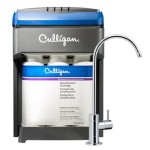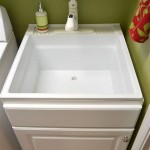Small Farmhouse Sinks: An Ideal Addition to the Laundry Room
The laundry room, often a utilitarian space, can greatly benefit from a touch of both functionality and aesthetic appeal. One way to achieve this is by incorporating a small farmhouse sink. These sinks, known for their distinctive apron fronts and robust construction, offer a practical washing solution while simultaneously enhancing the overall design of the laundry area, especially in smaller spaces.
Choosing the right sink for a limited laundry room footprint necessitates careful consideration of several factors, including size, material, installation method, and overall design compatibility. A small farmhouse sink can be an excellent option, providing ample basin space for hand-washing delicates, pre-treating stains, and cleaning larger items without overwhelming the available space. This article explores the advantages of small farmhouse sinks in the laundry room, the different types available, and key considerations when selecting the perfect model.
Maximizing Space and Functionality
The primary benefit of a small farmhouse sink in the laundry room is its ability to maximize space while maintaining essential functionality. Standard laundry tubs can be bulky and often lack the visual appeal desired in a modern home. A compact farmhouse sink, on the other hand, provides a deep basin for soaking and washing, while its apron-front design minimizes the overall footprint and allows for a more ergonomic working posture. This means less bending over, reducing strain during laundry tasks.
Furthermore, the deep basin of a farmhouse sink is particularly useful for pre-treating heavily soiled items or hand-washing delicate garments that require special care. Its generous size accommodates larger items such as blankets or quilts, making it a practical alternative to using a washing machine for lightly soiled or delicate items. This can contribute to water conservation and prolong the life of more sensitive fabrics.
Beyond its functional advantages, a small farmhouse sink can contribute to a more organized laundry space. It can be used to store cleaning supplies, laundry detergents, and stain removers, keeping these items readily accessible yet neatly concealed. This helps to declutter the laundry area and create a more visually appealing and efficient workspace.
Exploring Different Materials and Styles
Small farmhouse sinks are available in a variety of materials, each offering its unique aesthetic and functional properties. The most common materials include fireclay, stainless steel, cast iron, and composite materials.
Fireclay sinks are renowned for their durability and resistance to scratches, stains, and high temperatures. They are typically crafted from a mixture of clay and minerals fired at extremely high temperatures, resulting in a dense and non-porous surface. The classic white finish complements a wide range of laundry room styles, from traditional to contemporary. However, fireclay sinks can be relatively heavy, requiring sturdy cabinet support during installation.
Stainless steel farmhouse sinks offer a sleek and modern aesthetic. They are known for their durability, resistance to corrosion, and ease of cleaning. Stainless steel is also a hygienic material, making it suitable for a laundry room environment where cleanliness is paramount. The brushed or satin finish of stainless steel sinks helps to conceal scratches and water spots. However, stainless steel can be more prone to dents and noise compared to other materials.
Cast iron sinks, typically coated with a porcelain enamel finish, provide a classic and durable option. The enamel coating offers resistance to stains, scratches, and heat, while the cast iron core provides exceptional strength and sound dampening properties. Cast iron sinks are available in a variety of colors, allowing for customization to match the overall laundry room décor. However, they can be quite heavy and require professional installation.
Composite materials, such as granite composite or quartz composite, offer a blend of durability, aesthetics, and affordability. These materials are typically a mixture of natural stone particles and a resin binder, resulting in a strong and non-porous surface. Composite sinks are available in a variety of colors and textures, mimicking the look of natural stone while offering improved scratch and stain resistance. They are also typically lighter than fireclay or cast iron sinks, making them easier to install.
In terms of style, small farmhouse sinks can range from traditional apron-front models with decorative details to more modern and minimalist designs. The choice of style should complement the overall aesthetic of the laundry room and reflect personal preferences. Consider the shape of the sink basin as well; rectangular or square basins offer a more contemporary look, while rounded basins have a more traditional appeal.
Key Considerations for Installation and Sizing
Proper installation and sizing are crucial for ensuring the functionality and longevity of a small farmhouse sink in the laundry room. Before purchasing a sink, carefully measure the available space in the laundry room and determine the maximum dimensions that the sink can occupy without compromising the functionality of the surrounding area. Consider the depth of the sink basin as well; a deeper basin is more suitable for larger items, while a shallower basin may be sufficient for smaller tasks.
Farmhouse sinks, due to their apron-front design, typically require specialized cabinet modifications to accommodate the exposed front. This may involve cutting away sections of the existing cabinet or installing a custom-built cabinet designed specifically for a farmhouse sink. It is essential to consult with a qualified contractor or cabinet maker to ensure that the cabinet modifications are done correctly and that the sink is properly supported. The weight of the sink, especially fireclay and cast iron models, should be a major consideration when determining the type of cabinet and support structure required.
Plumbing requirements should also be carefully considered. Check the location of existing water supply lines and drain pipes to ensure compatibility with the new sink. It may be necessary to relocate or modify plumbing connections to accommodate the farmhouse sink. Ensure that the faucet chosen is compatible with the sink's faucet holes and that it provides adequate water pressure and flow rate. Consider installing a pull-down or sprayer faucet to enhance the sink's functionality for various laundry tasks.
Finally, consider the overall ergonomics of the sink installation. The height of the sink rim should be comfortable for the user to work at without bending over excessively. A standard countertop height of 36 inches is generally suitable for most individuals, but adjustments may be necessary depending on the user's height and preferences. Consider adding a small step stool for children or individuals with limited reach to allow them to comfortably use the sink.
By carefully considering these factors, homeowners can select and install a small farmhouse sink that not only enhances the functionality of their laundry room but also adds a touch of style and elegance to this often-overlooked space.

Farmhouse Style For The Laundry Room Small Size Delivers Big With New Fiamma 23 Inch Fireclay Sink By Ruvati Usa

Ruvati 23 Inch Fireclay Farmhouse Kitchen Laundry Utility Sink Single Bowl White Rvl2468wh Usa

Top 5 Farmhouse Laundry Room Sinks Within The Grove

10 Laundry Room Sink Ideas That You Need To Try Out

Diy Farmhouse Laundry Room Sink Cabinet Making Manzanita

Ellai 24 Inch White Ceramic Farm Style Wall Mount Utility Sink High Back Mounted Laundry Tub 10 Gallon Farmhouse Slop For Room

Laundry Room Small Farmhouse Sink Design Ideas

75 Laundry Room With A Farmhouse Sink And An Utility Design Ideas You Ll Love

Barrett 48 Inch Cast Iron Wall Mount Farmhouse Trough Sink

31 Laundry Room With Sink Ideas To Make Your Day Better







